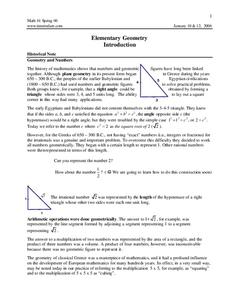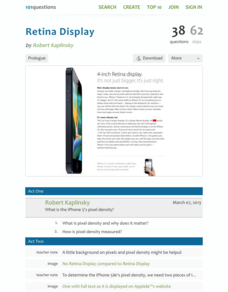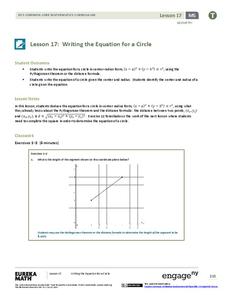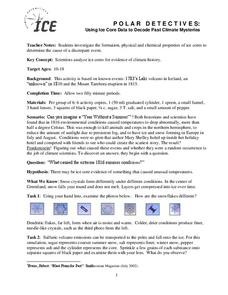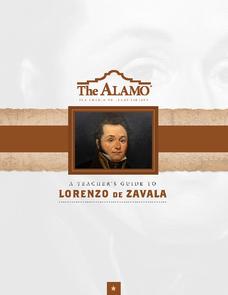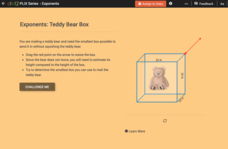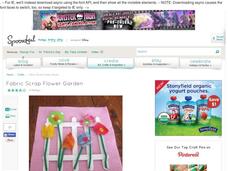Novelinks
The Giver: Vocabulary Bingo!
Bingo! Combine the thrill of bingo with Lois Lowry's The Giver in a fun vocabulary lesson. Kids write selected vocabulary words from the novel onto a bingo chart, and then listen for the correct definitions in order to mark off their words.
Mt. San Antonio Collage
Elementary Geometry
Your class may believe that geometry is a trial, but they don't know how right they are. A thorough math lesson combines the laws of logic with the laws of geometry. As high schoolers review the work of historical mathematicians and the...
Charleston School District
Identifying Irrational Numbers
These numbers have some personality! Are they rational or irrational? The lesson examines the definitions of rational and irrational numbers and shows examples of how to identify them.
Primary Resources
Venn Diagrams
Combine your lessons on Venn diagrams, probability, and multiples with several activities. After picking seven cubes, learners note the number of cubes that are blue and mark them in a Venn diagram. The next assignments prompt them to do...
Common Core Sheets
Determining Coordinates: Reading Positive & Negative Coordinates
For kids who have a hard time with graphing, a grid with coordinates can look like an unsolvable puzzle. A series of worksheets uses symbols and shapes like hearts, stars, and letters to help kids find the correct coordinates.
EngageNY
How Do Dilations Map Angles?
The key to understanding is making connections. Scholars explore angle dilations using properties of parallel lines. At completion, pupils prove that angles of a dilation preserve their original measure.
Mathematics Assessment Project
Fruit Boxes
Perfect for visual and hands-on learners, an engaging lesson prompts pupils to consider the different-sized boxes they can create from a piece of cardboard. They develop a model to determine the size of the box with the greatest volume.
EngageNY
Mid-Module Assessment Task: Grade 7 Mathematics Module 3
Lesson 16 in the series of 28 is a mid-module assessment. Learners simplify expressions, write and solve equations, and write and solve inequalities. Most questions begin as word problems adding a critical thinking component to the...
101 Questions
Retina Display
Learners calculate the pixel density of a specific cell phone using the concept of similarity. They use information from the cell phone's website to make their calculations and then compare their results to the posted information.
Humanities Texas
Primary Source Worksheet: Theodore Roosevelt, Excerpt from Eighth Annual Message to Congress
As Theodore Roosevelt reminded Congress in 1908, corporation one is not corporation two. Readers of this excerpt from Roosevelt's Message to Congress have an opportunity to sharpen their comprehension skills as they study this primary...
Charleston School District
Transformation Basics
Transformations are more than the process in which sports cars become fighting robots. Listed in terms of which transformations give congruent or similar figures, several resources provide definitions and examples of the four basic...
EngageNY
Writing the Equation for a Circle
Circles aren't functions, so how is it possible to write the equation for a circle? Pupils first develop the equation of a circle through application of the Pythagorean Theorem. The lesson then provides an exercise set for learners to...
EngageNY
A Surprising Boost from Geometry
Working with imaginary numbers — this is where it gets complex! After exploring the graph of complex numbers, learners simplify them using addition, subtraction, and multiplication.
Polar Trec
Polar Detectives: Using Ice Core Data to Decode Past Climate Mysteries
How does examining an ice core tell us about weather? Learners set up and explore fake ice cores made of sugar, salt, and ash to represent historical snowfall and volcanic eruptions. From their setups, scholars determine what caused the...
Scholastic
Lesson One: The Earth, Background and Glossary
How much do you really know about our planet? Middle schoolers build up their prior knowledge about Earth, its placement in the solar system, its composition, and important geological vocabulary with an introductory earth science lesson.
The Alamo
A Teacher’s Guide to Lorenzo De Zavala
Who was Lorenzo de Zavala to the Texas Revolution, and how did he change the Alamo? Find out using an educational resource that asks learners to fill out graphic organizers and respond to short-answer questions to further solidify their...
Reed Novel Studies
Sing Down The Moon: Novel Study
Human trafficking has existed in many forms throughout history. Using a novel study of Sing Down the Moon by Scott O'Dell, readers learn the story of a young Native American girl taken into slavery. Reading comprehension and vocabulary...
CK-12 Foundation
Whole Number Exponents: Teddy Bear Box
Five questions—multiple-choice, fill in the blank, and discussion—make up an interactive that challenges scholars to mail a teddy bear using the smallest box possible without squishing it. A box with movable sides allows mathematicians...
Curated OER
Layer Cake Archaeology
Excavating cake? Why not! Kids spoon into some layers and artifacts during this tasty hands-on activity. The cake, a simulated archaeological dig, is the object of observation and discussion.
abcteach
Community Walk
Invite your pupils to explore their surroundings with a walk around the neighborhood. Learners use their senses to make observations about their surroundings.
K12 Reader
Where On Earth Are You?
What do we use to determine the exact locations on the earth? Your kids can learn all about compass roses and latitude and longitude. Test understanding with the five reading comprehension questions included on the page.
Curated OER
Homophones and Homographs
Getting tired of correcting to, two, and too? What about weather and whether? Use a thorough lesson on homophones and homographs to clear up those differences. Fourth and fifth graders identify which words sound the same and are spelled...
Curated OER
Fabric Scrap Flower Garden
Crafting is fun, it increases eye-hand coordination, and it is a great way to accent any lesson. Celebrate Earth Day by creating scrap fabric flowers for a pop-stick flower garden. Children of all ages will love gluing, cutting, and...
Tools for Schools
Book Creator
Build beautiful books in whatever style you'd like with an intuitive and adaptable app for constructing books. Kids can add images, drawings, text, and audio to make books about any subject. When complete, learners can wrap up the...
Other popular searches
- Finding Area in Square Units
- Area Square Units
- Math Area Square Units
- Area in Square Units
- Count the Square Units
- Area of Square Units
- Area and Square Units
- Changing Square Units
- Square Units Worksheet
- Square Units Blocks
- Math Square Units
- Perimeter in Square Units



